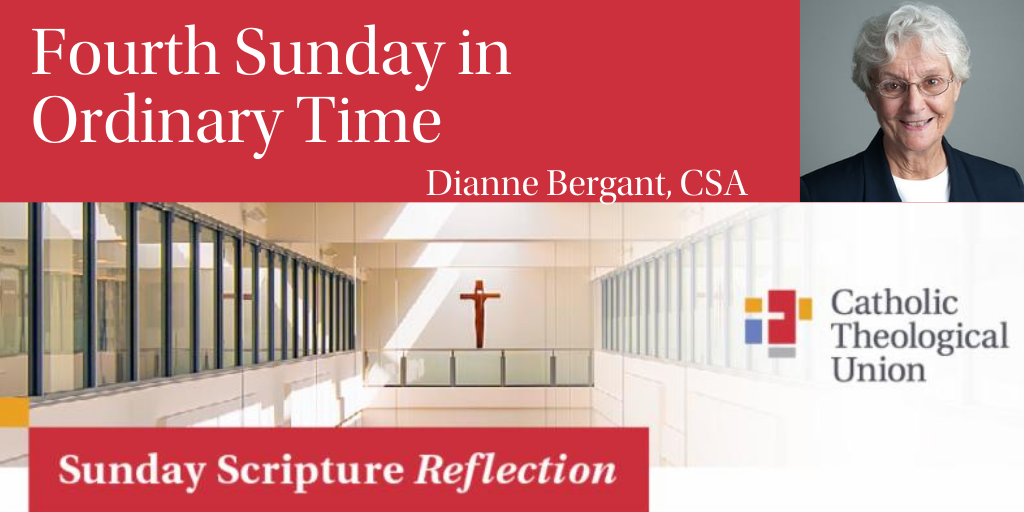

Readings:
Reading 1: Jer 1:4-7, 17-19
Responsorial Psalm: Ps 71:1-6, 15, 17
Reading 2: 1 Corinthians 12:31─13:13
Gospel: Luke 4:21-30
I love you; You’re perfect; Now change!
The title of today’s reflection is the name of a highly acclaimed musical comedy that has made the rounds in some of the major cities of the country several years ago. It also describes some of the dynamics found in many human love relationships. It sometimes happens that we genuinely love someone and are captivated by that person’s charm and wit, intelligence and sensitivity, unselfishness and caring disposition. However, it is not uncommon that, despite our initial openness to the other, we soon feel a responsibility to overhaul what we think should be changed in that person. We claim that we want to make her or him better, to bring out the best that we know is there somewhere. On the musical stage, this attempt to improve another may be a sure recipe for wicked humor; but in real life, it can undermine the love relationship and even tear it apart.
Some form of love underlies every memorable story ever told and most of the music that is composed. After all, we have all heard that ‘Love makes the world go ‘round.’ We know that love is a primary motivator of a good deal of human behavior, and that it also serves as a deterrent to unsavory ways of acting. When we are young, we think that we know so much about love, and we might even resent anyone telling us differently. Then as we get older, we realize just how little we actually do know about it. Still, throughout life, everyone searches for some form of love, and for someone upon whom to lavish the love we have to offer.
Today’s reading from 1 Corinthians is THE classic definition of love. Even those people who do not cherish our biblical tradition acknowledge this. While the reading might affirm the first part of the musical’s title, namely: ‘I love you,’ it does not subscribe to the other two phrases. It does not demand that the loved one be perfect. In fact, if she or he were perfect, we would not have to be “patient,” as Paul insists, nor would we have to “bear all things.” And as for the last phrase of the title, the reading suggests that we ourselves, not those whom we love, are the ones who must ‘Now change.’ The musical comedy might be very entertaining, but this biblical exhortation calls us to a kind of self-emptying that is close to heroic.
As we read the list of love’s characteristics, we realize just how counter-cultural love is. Our society does not encourage us to be patient, or even kind. In fact, it admonishes us to seek our own interests, to look out for ‘Number One.’ It applauds pomposity and ego-inflation; it requires that we ridicule, even despise those who hold different social or political views. And we often become complicit in such vilification when we unthinkingly pay tribute to them at their various altars. Furthermore, so much within the media promotes rudeness and quick tempers. And as far as truth is concerned, this is not always a valued commodity. In fact, we may feel that we have been lied to so many times that we are suspicious of anyone who claims to be telling the truth.
The gospel reading tells us that the people of Nazareth were fickle in their acceptance of Jesus. At first “all spoke highly of him and were amazed at the gracious words that came from his mouth,” but they soon turned against him. Theirs was not the kind of love described by Paul. They spoke highly of Jesus, because they wanted him to perform for them the kind of miracles he had performed in Capernaum. They wanted a messiah who would work miracles, not one who would challenge them to live differently, to love unselfishly and wholeheartedly. Jesus, on the other hand, was more like the prophet described in the reading from the Book of Jeremiah. There we find one who was told to gird his loins, something done when preparing for a strenuous activity like battle. He had to be ready to face those who “will fight against you.” The prophet faced such opposition, and Jesus did as well, for the people of his own town rose up against him and sought to hurl him off a cliff.
Despite the fact that we all want and need love, it seems to be so difficult to give it. However, if we stop for a moment and reflect, we might discover that we can indeed point to such love in our lives. The people we really admire the most are those who are indeed patient and kind, not jealous or pompous, not inflated or rude, not quick-tempered or brooding. They are people who genuinely love, people after whom we might want to model ourselves rather than make over. They are people who are not misled by flattery or crushed by opposition. They are genuine people who have discovered what love really means, what Paul calls the “more excellent way.” Our world so desperately needs this kind of love.